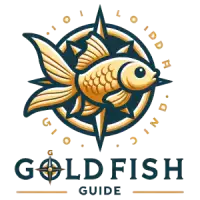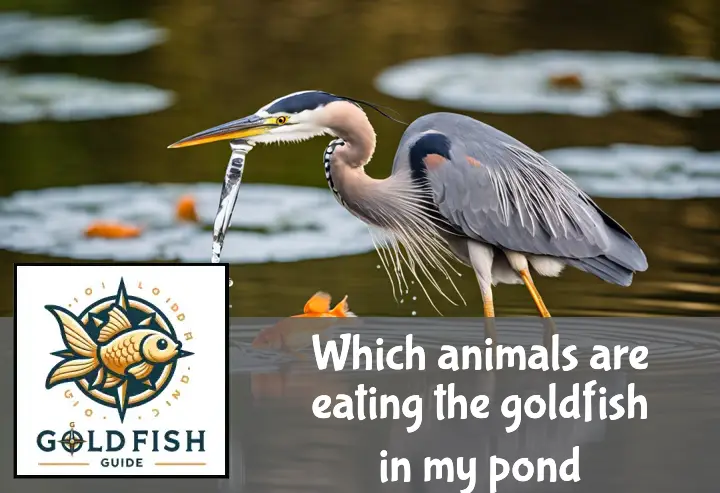Ever found yourself scratching your head, wondering, “What in the world is munching on my precious goldfish?” Well, you’re not alone! Many of us have faced this mystery. Often, the culprit is one of several animals eating goldfish in pond.
In this post, we’ll delve into who these sneaky critters might be and how to spot them. So grab a cuppa joe and settle in because it’s about to get interesting! Keep reading about ‘Which animals are eating the goldfish in my pond?’
Key Takeaways
- The main predators of goldfish in ponds are herons, raccoons, cats, and foxes.
- Other potential threats include snakes, frogs, and large insects.
- Birds of prey such as hawks or owls may also target goldfish.
- Domestic pets can pose a risk if they have access to the pond.
- In some cases, larger fish in the pond may eat smaller goldfish.
- To protect your goldfish, consider measures like netting over the pond or scare devices for birds.
Understanding the Predators
When it comes to animals eating goldfish in ponds, there’s a whole gang of culprits that could be responsible. These pond predators have unique animal characteristics and exhibit specific predator behavior that can help you identify them.
Identifying Common Pond Predators
First up, we’ve got raccoons. These masked marauders are notorious for their love of fishy snacks. They’re one of the most common pond animals and a major threat to your goldfish. Next, we have herons. These tall, elegant birds might look innocent but they’re skilled fish hunters.
But wait, there’s more! Don’t forget about cats. Yes, your cute and cuddly feline friend might also be a potential goldfish predator! And lastly, let’s not overlook snakes. Some species are excellent swimmers and wouldn’t say no to a tasty goldfish treat.
Recognizing Signs of Predator Presence
Now that we know who the usual suspects are, how do you tell if they’re lurking around your pond? Well, for starters, keep an eye out for footprints or feathers near the water’s edge – these are clear signs of predators.
If you notice any sudden decrease in your goldfish population or see scales scattered around the pond – bingo! You’ve got yourself a predator problem. Remember, recognizing these signs early is crucial in protecting your finned friends from becoming someone else’s dinner!
So there you have it folks – a quick guide on identifying those pesky predators and spotting their sneaky signs. Stay vigilant and keep those goldfish safe!
Birds as Goldfish Predators
When it comes to animals eating goldfish in ponds, birds pose a significant threat. Specifically, herons and kingfishers have developed unique hunting techniques that can wreak havoc on your pond’s ecosystem.
Herons: The Stealthy Hunter
Herons are the ninjas of the bird world when it comes to hunting goldfish. They employ a stealthy hunting technique, standing motionless by the pond’s edge, waiting for an unsuspecting fish to swim by.
Once they spot their prey, they strike with lightning speed. This method of hunting has a significant impact on the goldfish population in your pond. It’s like having a silent assassin lurking around, always ready to pounce.
Kingfishers: The Dive Bomber
Kingfishers, on the other hand, are more like aerial acrobats. These birds use a spectacular dive-bombing technique to catch their meals. They hover above the water, then dive straight down into the pond at high speed to snatch up their prey.
This effective method can also take a toll on your goldfish population. It’s akin to having a tiny bomber flying overhead, ready to dive at any moment. Protecting your goldfish from these feathered predators might be more challenging than you think!
Mammals as Goldfish Predators
When it comes to animals eating goldfish in ponds, mammals pose a significant threat. Particularly, raccoons and cats are notorious goldfish predators. Their hunting habits can be quite distressing for pond owners who cherish their finned friends.
Raccoons: The Night Raiders
Raccoons, those furry bandits of the night, have a knack for raccoon goldfish predation. They’re crafty critters with a taste for fish and aren’t afraid to dip their paws into your pond under the cover of darkness.
These nocturnal goldfish threats use their nimble fingers to scoop up unsuspecting goldfish during their raccoon night raids. Their fishing techniques are surprisingly sophisticated for such wild creatures.
But don’t despair! There are ways to prevent these midnight marauders from turning your pond into an all-night sushi bar. Implementing deterrents like motion-activated sprinklers or installing pond netting can help safeguard your fish from these mammalian threats.
Cats: The Silent Stalkers
Cats, on the other hand, pose a different kind of threat to your aquatic pets. These silent stalkers rely on stealth rather than brute force when it comes to cat pond hunting.
Their stalking behavior can be nerve-wracking for any goldfish owner. A cat’s patience and precision make them formidable feline goldfish predators, capable of snatching a fish right out of the water without making a splash.
But fear not! There are ways to protect your scaly pals from these furtive hunters too. Using scent-based repellents or creating physical barriers around the pond can deter cats from turning your beloved goldfish into an impromptu snack. Remember, protecting your fish from these silent predators is all about being proactive and creative!
Reptiles and Amphibians as Goldfish Predators
In the world of goldfish predators, reptiles and amphibians often play a surprising role. These reptile threats to goldfish and amphibian goldfish predators can disrupt the balance of your peaceful pond ecosystem.
Snakes: The Slithering Threat
When it comes to snake predation, certain species have a taste for fish, making them real threats to your pond’s goldfish population. They’re sneaky, slithering in and out of water with ease, catching unsuspecting goldfish off guard.
But don’t panic just yet! There are ways to prevent this from happening. One effective method is installing snake-proof fencing around your pond. Another is keeping the area clean and free from debris where snakes might hide. Remember, prevention is always better than cure when dealing with potential snake species in ponds.
Frogs and Turtles: Unlikely but Possible Predators
Frogs and turtles may not be the first creatures that come to mind when thinking about animals eating goldfish in pond, but they can pose a threat too. Some larger frog species have been known to snack on small fish when other food sources are scarce.
Turtles, on the other hand, usually prefer a plant-based diet but won’t say no to an easy meal if one swims by. So while they’re not typically considered dangerous, these unlikely pond predators could potentially turn your goldfish into dinner.
To keep your fish safe from these unexpected threats, consider providing plenty of hiding spots for your fish or even introducing some natural frog and turtle predators into the mix. Just remember – maintaining a balanced ecosystem is key!
Fish as Goldfish Predators
When we think of animals eating goldfish in pond, our minds often jump to creatures like herons or cats. But, surprise, surprise! Other fish can also pose a significant threat to your beloved goldfish. Yes, you heard it right! Your peaceful pond might be a battleground for survival.
Larger Fish Species in Ponds
Now let’s dive into the details about these larger pond fish that have a taste for goldfish. Koi and carp are two common culprits. These big guys are known to snack on smaller fish when food is scarce.
Their predatory behavior isn’t personal; it’s just nature doing its thing. They’re not evil masterminds plotting against your goldfish; they’re just hungry and opportunistic. So, if you’ve got koi or carp in your pond, keep an eye out for any goldfish-eating fish activities.
Invasive Species
Moving onto another threat – invasive species. These uninvited guests can wreak havoc on local ecosystems and pose a serious risk to goldfish populations. They’re like the party crashers who eat all the food and leave a mess behind.
Species like snakehead fish or round gobies can outcompete native species for resources and even turn them into lunch! Talk about adding insult to injury! These non-native pond threats disrupt the balance of aquatic life, making survival tough for our golden friends.
So there you have it folks – other fish can indeed be goldfish predators too! It’s not always the usual suspects causing trouble in paradise.
Preventive Measures to Protect Your Goldfish
Let’s talk about how to keep those pesky animals eating goldfish in pond at bay. You’ve got a few options, like using pond netting or covers, installing predator deterrents, and creating safe zones for your fish.
Using Pond Netting or Covers
Pond netting or covers are your first line of defense against predators. They’re like the bouncers at a club, keeping the riff-raff out. Different types have different perks, but they all share one thing: they’re great at protecting goldfish with netting. Some are more robust, others more subtle – choose what suits your pond best. Remember though, even the best pond covers for goldfish can’t guarantee 100% safety.
Installing Predator Deterrents
Next up is installing predator deterrents. Think of these as your security system – they’re there to scare off any unwanted visitors. There’s a whole range of effective predator deterrents for ponds, from motion-activated sprinklers to ultrasonic devices. When you install predator deterrents in ponds, you’re giving your goldfish an extra layer of protection.
Creating Safe Zones for Your Goldfish
Lastly, consider creating safe zones within the pond itself. These are like panic rooms for your fish – places they can hide when danger lurks nearby. A good safe zone has plenty of cover and is difficult for predators to access. So go ahead and get creative with it! After all, nothing says ‘I love my goldfish’ quite like building them their own personal fortress!
To Wrap Up
So, we’ve been on quite a journey, haven’t we? Like Sherlock Holmes sniffing out the culprit, we’ve discovered that herons, raccoons and cats are the usual suspects when it comes to animals eating goldfish in pond.
Remember, your goldfish are like tiny aquatic toddlers – curious and vulnerable. So, keep an eye out for these mischievous intruders and protect your fishy friends!



